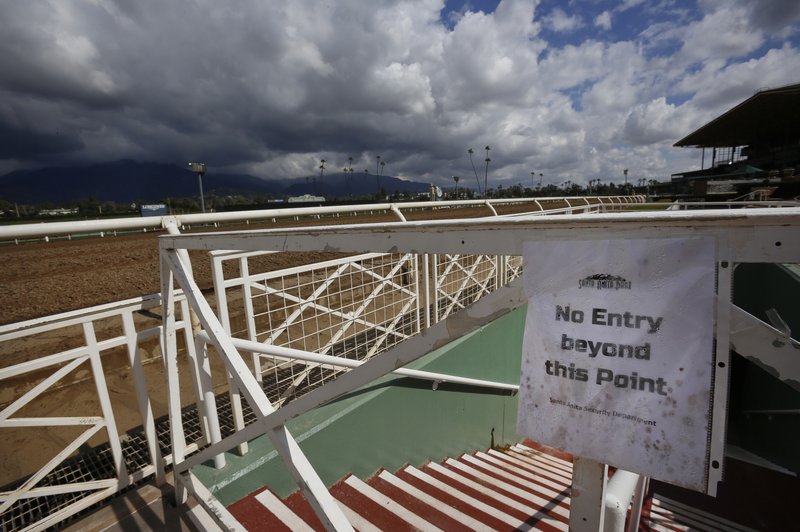ARCADIA, Calif. -- Santa Anita plans to resume racing on Friday, March 29, pending approval of new safety and medication rules by the California Horse Racing Board.
Racing has been suspended since March 5 at the track, where 22 horses have suffered fatal injuries since Dec. 26. Limited training is being allowed on the main dirt track while testing of the surface and new rules involving safety and medication are being worked out.
The track, along with Golden Gate Fields in Northern California, and the Thoroughbred Owners of California reached agreement late Saturday to enact the most stringent medication rules in North America.
All horses born during or after 2018 will race at Santa Anita and Golden Gate with no race-day medication, including the anti-bleeding medication Lasix. That means all 2-year-old horses starting in 2020 and after will race medication-free.
All horses born before 2018 will race at the two tracks owned by The Stronach Group under the same guidelines, but Lasix will still be permitted only at 50 percent of current levels.
Dionne Benson, executive director of the Racing Medication & Testing Consortium, said extra time to adjust is necessary since the Lasix change will require many trainers to manage their horses without the medication for the first time.
Nearly every country outside the U.S. bans the use of Lasix on race days. Only 3.6 percent of the nearly 300,000 starts last year in the U.S. were made without Lasix, according to The Jockey Club.
California Horse Racing Board Chairman Chuck Winner said he will move the previously scheduled March 21 board meeting to March 28 in order for the full board to consider and vote on items that need its approval. The later date complies with the legally required 10-day public notice for meetings.
Santa Anita, Golden Gate and the Thoroughbred Owners of California (TOC) have agreed on the following:
• Transparency on all veterinary records.
• Strict limits on the use of any pain or anti-inflammatory medication and treatment, including legal therapeutic anti-inflammatory drugs, joint injections, shockwave therapy and anabolic steroids.
• Trainers must apply for permission to have their horses participate in timed workouts at least 48 hours in advance.
• No therapeutic medications or treatments will be allowed without a qualified veterinary diagnosis from a state-licensed vet.
• Strict out-of-competition testing.
• Increasing the time required for horses to be on-site before a race.
• Investment by The Stronach Group (TSG) in diagnostic equipment to help in the early detection of pre-existing conditions in horses.
"TSG is committed to the principles of safe horse racing for both equine and human athletes and to making California racing the best in the world," said Belinda Stronach, TSG chairwoman and president. "It is my hope the other tracks in California will follow suit."
TSG negotiated with TOC and the California Thoroughbred Trainers to reach the agreement.
"I am confident we all share the same goal of making California racing safer and doing everything we can to provide additional safety and protection for our horses," said Greg Avioli, TOC president and CEO.
The new rules could result in trainers and owners moving their horses to other states with less restrictive medication rules.
The Los Angeles district attorney's office said Friday it would work with the California Horse Racing Board to investigate what caused the horses to break down.
People for the Ethical Treatment of Animals has also urged an investigation into trainers and vets.
Sports on 03/18/2019
